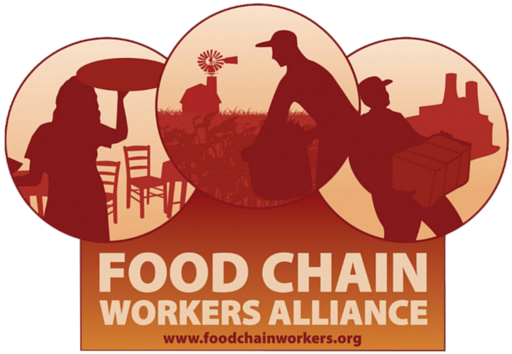Note: This statement is based on consensus reached in the FCWA certification committee and broader discussions amongst all FCWA members. It borrows heavily from members’ existing documents, including the International Labor Rights Forum’s Roadmap for Ethical Product Certification and Standard Setting Initiatives and the Domestic Fair Trade Association Principles.
The Food Chain Workers Alliance has no current plans to develop our own certification program or engage directly in any independent standard-setting. That being said, FCWA members are already actively engaged in ongoing certification-related work, ranging from participating in other standards-setting processes, playing a crucial watchdog role, and developing and implementing certification programs. This statement was developed to guide the Alliance’s work on these various levels and to serve as an educational tool to the public, allies, and others.
It is crucial that the priorities and perspectives of workers and their representative organizations are reflected in any certification program, and particularly in social justice and fair trade certification. The primary purpose of social certification programs should be a rights-based approach that empowers workers and conforms to international norms including ILO Conventions and other relevant Human Rights treaties. As stated by ILRF, “These programs should address the power imbalance inherent in current sourcing relationships that lead to rock-bottom product prices, contractor non-compliance, and poverty wages for workers.”
FCWA believes that the following criteria should form the basis for any legitimate market-based claim of fair or just working conditions, as part of a certification, Corporate Code of Conduct, or other private claim:
- The Right to Freedom of Association and Collective Bargaining: Some food system workers in the U.S. such as farmworkers are not covered by rights granted under the National Labor Relations Act (NLRA), and for workers outside of the U.S., it is commonplace for temporary workers to be left out of the law all together. For other food system workers, enforcement is inexcusably weak. Certification programs should go above and beyond legal protections to ensure that the right of all workers to organize is respected, with zero tolerance for employer retaliation against workers exercising this right.
-
 Fair contracts: Fair worker contracts include access to union and other worker representatives, a fair grievance process with an appeal beyond the employer, and a strong non-discrimination policy.
Fair contracts: Fair worker contracts include access to union and other worker representatives, a fair grievance process with an appeal beyond the employer, and a strong non-discrimination policy.
- Direct involvement of and participation by workers and their organizations: As stated by ILRF, “Workers are the best ‘monitors’ or ‘auditors’ of their workplace, and any certification system should rely on and reinforce this system rather than try to supplant it.” On the broader programmatic level, multi-stakeholder processes to develop standards and policies should always include workers and their organizations in a decision-making role on an equal basis to other stakeholders. All programs should have a fully functioning complaints process for when violations occur that workers have access to without fear of retaliation of any kind.
- Living wages and fair pricing: Employers participating in certification programs should pay living wages and social protection benefits. Premiums derived from private labels should be shared with workers to ensure an “equitable distribution of the fruits of trade” (DFTA). Innovative approaches including profit-sharing and cooperative structures should be encouraged.
- Occupational health and safety: Food system workers are regularly exposed to toxins, mechanical and equipment dangers, ergonomic stresses from an unhealthy workplace, and other health and safety risks. Certification programs should ensure a safe and healthy workplace.
- Child Labor: “The participation of children (if any) [should] not adversely affect their well-being, security, educational requirements and need for play and conforms to the UN Convention on the Rights of the Child as well as pertinent local/regional laws” (DFTA). Where local laws do not provide adequate protection, ILO Conventions and other relevant international protocols should be followed.
- Capacity Building and Training: Workers should have access to relevant training, including their labor rights, and educational opportunities.
- Transparency and full disclosure: Audit reports, corrective action plans, and other standard implementation instruments need to be accessible to all workers via a public forum. Programs should follow good practices to ensure public access to decision-making and oversight processes, as well as certified operations.
- Full supply chain approach: FCWA recognizes that some certification programs will cover only part of the food chain. When they are done well, we will support them. However, we strongly urge that certification should take a whole supply chain approach – products should be grown, harvested, processed, packaged, transported, and sold without exploitation of workers anywhere along the line.

